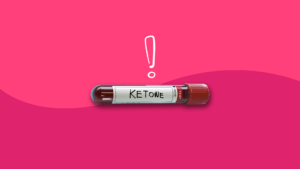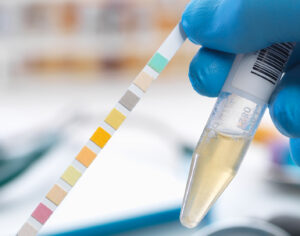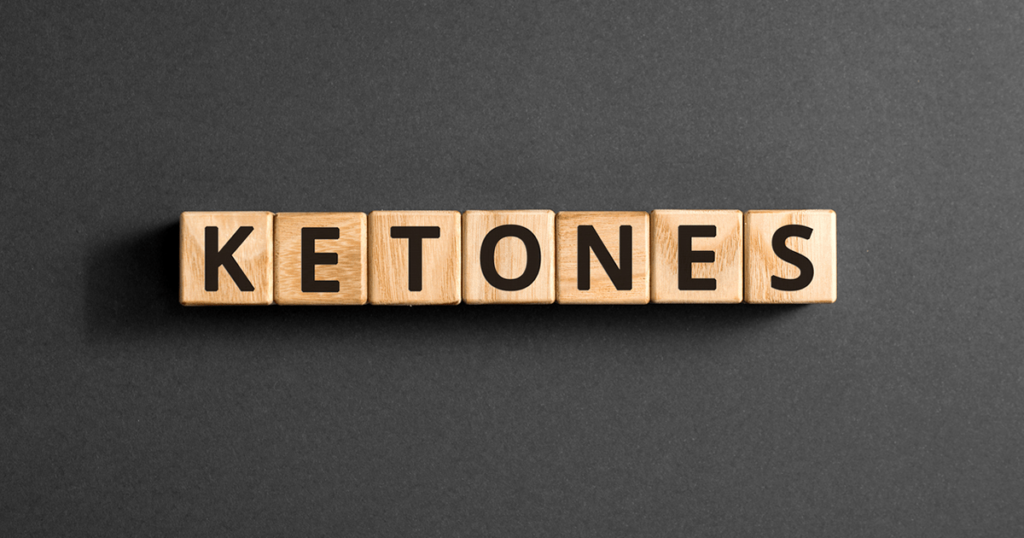The ketones in urine test is a popular way to measure the level of ketosis in your body. Your liver produces ketones when it breaks down fat. The liver also uses the fat for fuel instead of carbohydrates. A diet with fewer carbs than normal will make your body have more ketones. A glucose meter has numbers from 0 to 400. The higher the number, the more sugar in your body. If you have a high number on the meter, then you need food or supplements with carbs in them.
Contents
What are Ketones?

Ketones are organic compounds that our body produces when there is a lack of insulin. When someone has diabetes, their cells cannot use glucose for energy. This is because they do not have enough insulin to process it. They start breaking down fat, which leads to ketone production in the blood and urine. This condition is ketosis.
Ketones generate when the body has an excess of fatty acids in the blood. Too much fat can also cause diarrhea, nausea, and vomiting. When ketones are in your urine, it means that your body isn’t processing carbs well. You may have diabetes or another medical condition. This condition needs immediate attention from a doctor if it is left untreated.
Why are ketones dangerous?
Ketones in the urine can be a sign of diabetes, but they can also mean that something else is going on. When ketones show up without another explanation, it is usually a danger to your health. If you have high levels of ketones in your blood, but no other reason for them to be there, this is called diabetic ketoacidosis. It can happen to people with type I or type II diabetes. When ketones spill over into your urine, this is a life-threatening medical emergency. It can lead to a chemical imbalance in your body.
How can I tell if my ketone levels are high?
There is a simple urine test to measure the number of ketones in your body. If you want to know your blood sugar level, then you can either buy a machine that tests it or use special strips that go into your morning urine. Most people find the strips easier. If you have diabetes, you should test for ketones every time your blood sugar is high. Some people only need to check their urine when they feel sick or if there are other symptoms.
When should I test for ketones, and how?
You should test for ketones when your blood sugar is high. If you are worried about DKA, check your pee too.
When testing for ketones with a strip, be sure not to use the same container that you urinate in. The ketone strips can be inaccurate if your blood sugar is low. You should do this when you have high blood sugar, too.
How does DKA happen?
DKA occurs when there’s not enough insulin in the body to process sugar (glucose) and starches. One cannot use sugars for energy, so they build up in your blood.
If your body is making ketones, you need to get medical help. DKA can lead to death if it’s not treated. But if you take the treatment, it won’t happen.
What should I do if I have high ketone levels?
If you think that your body cannot process sugar, then you need to get emergency medical help. Until you can get to a hospital, take the following steps:

- Stop taking insulin if you are using it.
- Give your body sugar through juice or soda
- Do not drink alcohol. Get help with other drugs that may be contributing to ketone production.
- Administer emergency glucagon injections yourself
- Call 911 immediately
- Stay on the phone while you go to an emergency room
Do not stop taking insulin without medical guidance. It is dangerous to do this and it could cause a life-threatening situation. If possible, have another person drive while you call 911, because DKA can affect your judgment and motor skills.
You should test for ketones when your blood sugar is high. People who are concerned about ketoacidosis should also check their urine. If you feel sick or have symptoms of a cold or flu that won’t go away, it is helpful to check your urine.
When testing for ketones with a strip, be sure not to use the same container used for urinating. This can contaminate the test and give you a false reading.If you use blood ketone testing strips, it is best to do this when your blood sugar is high. This way, the ketones will have an impact on your body and you can know how much they affect you.
Ketones in the urine can be a sign of diabetic ketoacidosis (DKA), a life-threatening complication. Diabetic ketoacidosis is a condition that usually only happens to type I diabetics or people who have insulin resistance. This means that their body doesn’t produce enough insulin which can cause this condition. There are different ways to find out if there are ketones in your urine. If you know the symptoms, you can tell your doctor.
Ketone bodies are produced when the body does not have enough insulin. Sugar is broken down instead of fat, so ketone bodies are made. This happens when someone is diabetic or pre-diabetic because their cells don’t get the glucose that they need.
When should I call my doctor about this?
If you notice that your urine smells sweet and fruity, you might be experiencing ketones.

- Your breath has an acetone-like odor; the same as nail polish remover smells.
- Ketones can come out through your sweat. This causes bad breath that smells like sour milk or vomit.
- Don’t be alarmed if you experience cold, clammy skin.
If any of these signs are severe or last for more than a couple of days; it is time to make an appointment with your doctor.
What is the role of exercises?
Exercise increases the amount of oxygen in your body. When you exercise, you breathe more often and deeply than when you are not exercising. If you have more oxygen in your blood, it is transported to cells throughout the body. Then they can do more work with these nutrients.
In order for muscles to do more work, they need energy. This is where ketones come into play. Your body makes ketone bodies when you need more energy. It uses fat instead of glucose from carbohydrates as its main source of fuel. As the number of ketones in your blood increases, this means you have entered a state where your body is using fat as its main energy source.
Recently, there has been some disagreement about how to use urine strips to see if you are in ketosis. Some people think that this is accurate while others do not. Some people think that doing a test with these strips can be dangerous to your health.
Remember that you want to lose weight and be healthy at the same time. If you are following a ketogenic diet, it might take a long time for your body to enter into ketosis. You will know that you are in ketosis when your urine turns dark or when you do a blood test.
Urine strips are not the only way to find out if you have ketones, but they can give you an idea of how your metabolism is. They may be convenient and inexpensive, but they are not always accurate. It depends on how good you are at following your diet.
Conclusion
Ketones in the urine can be a sign of diabetes. If you notice any change in your urination patterns, it would be best to contact your doctor for further testing and diagnosis so that the appropriate treatment plan can start as soon as possible. People who develop ketoacidosis may produce large amounts of acetone or other substances from the fat breakdown (ketones) which is excreted through their breath, skin, and urine. The presence of these ketones in the blood indicates that not enough insulin has been produced or there is an issue with absorption at some point along the way; this condition requires immediate medical attention.
Do you want to get rid of diabetes? Join our online diabetes consultation program and reverse your Diabetes naturally through lifestyle changes such as a Personalized Diet plan, Exercise, dieticians, and health coaches.


